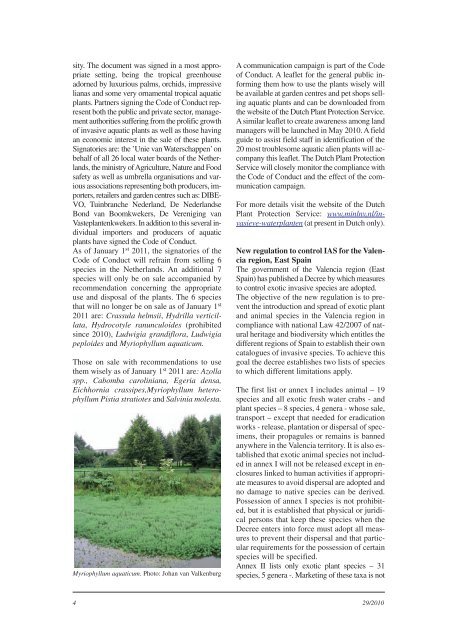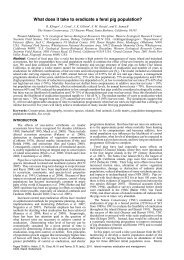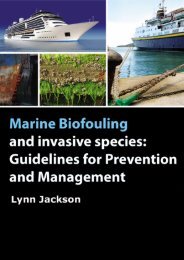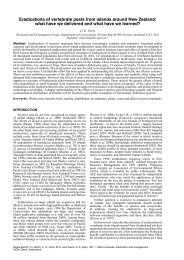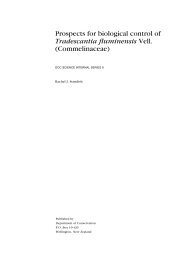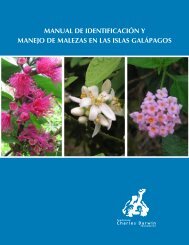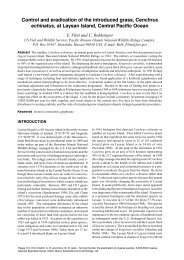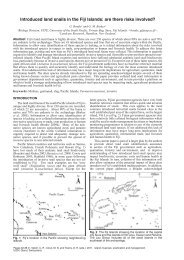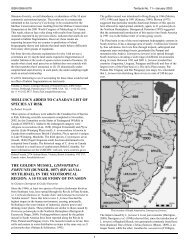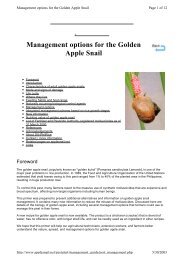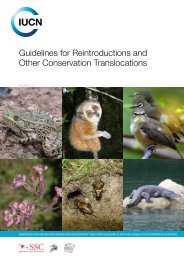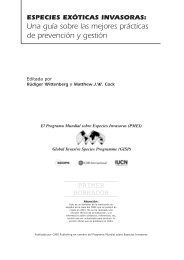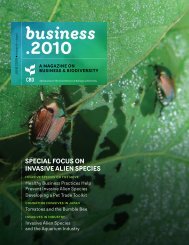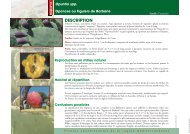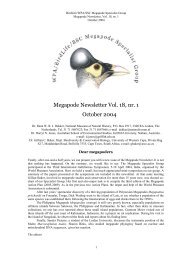Aliens Newsletter - ISSG
Aliens Newsletter - ISSG
Aliens Newsletter - ISSG
Create successful ePaper yourself
Turn your PDF publications into a flip-book with our unique Google optimized e-Paper software.
sity. The document was signed in a most appropriate<br />
setting, being the tropical greenhouse<br />
adorned by luxurious palms, orchids, impressive<br />
lianas and some very ornamental tropical aquatic<br />
plants. Partners signing the Code of Conduct represent<br />
both the public and private sector, management<br />
authorities suffering from the prolific growth<br />
of invasive aquatic plants as well as those having<br />
an economic interest in the sale of these plants.<br />
Signatories are: the ’Unie van Waterschappen’on<br />
behalf of all 26 local water boards of the Netherlands,<br />
the ministry of Agriculture, Nature and Food<br />
safety as well as umbrella organisations and various<br />
associations representing both producers, importers,<br />
retailers and garden centres such as: DIBE-<br />
VO, Tuinbranche Nederland, De Nederlandse<br />
Bond van Boomkwekers, De Vereniging van<br />
Vasteplantenkwekers. In addition to this several individual<br />
importers and producers of aquatic<br />
plants have signed the Code of Conduct.<br />
As of January 1 st 2011, the signatories of the<br />
Code of Conduct will refrain from selling 6<br />
species in the Netherlands. An additional 7<br />
species will only be on sale accompanied by<br />
recommendation concerning the appropriate<br />
use and disposal of the plants. The 6 species<br />
that will no longer be on sale as of January 1 st<br />
2011 are: Crassula helmsii, Hydrilla verticillata,<br />
Hydrocotyle ranunculoides (prohibited<br />
since 2010), Ludwigia grandiflora, Ludwigia<br />
peploides and Myriophyllum aquaticum.<br />
Those on sale with recommendations to use<br />
them wisely as of January 1 st 2011 are: Azolla<br />
spp., Cabomba caroliniana, Egeria densa,<br />
Eichhornia crassipes,Myriophyllum heterophyllum<br />
Pistia stratiotes and Salvinia molesta.<br />
Myriophyllum aquaticum. Photo: Johan van Valkenburg<br />
A communication campaign is part of the Code<br />
of Conduct. A leaflet for the general public informing<br />
them how to use the plants wisely will<br />
be available at garden centres and pet shops selling<br />
aquatic plants and can be downloaded from<br />
the website of the Dutch Plant Protection Service.<br />
A similar leaflet to create awareness among land<br />
managers will be launched in May 2010. A field<br />
guide to assist field staff in identification of the<br />
20 most troublesome aquatic alien plants will accompany<br />
this leaflet. The Dutch Plant Protection<br />
Service will closely monitor the compliance with<br />
the Code of Conduct and the effect of the communication<br />
campaign.<br />
For more details visit the website of the Dutch<br />
Plant Protection Service: www.minlnv.nl/invasieve-waterplanten<br />
(at present in Dutch only).<br />
New regulation to control IAS for the Valencia<br />
region, East Spain<br />
The government of the Valencia region (East<br />
Spain) has published a Decree by which measures<br />
to control exotic invasive species are adopted.<br />
The objective of the new regulation is to prevent<br />
the introduction and spread of exotic plant<br />
and animal species in the Valencia region in<br />
compliance with national Law 42/2007 of natural<br />
heritage and biodiversity which entitles the<br />
different regions of Spain to establish their own<br />
catalogues of invasive species. To achieve this<br />
goal the decree establishes two lists of species<br />
to which different limitations apply.<br />
The first list or annex I includes animal – 19<br />
species and all exotic fresh water crabs - and<br />
plant species – 8 species, 4 genera - whose sale,<br />
transport – except that needed for eradication<br />
works - release, plantation or dispersal of specimens,<br />
their propagules or remains is banned<br />
anywhere in the Valencia territory. It is also established<br />
that exotic animal species not included<br />
in annex I will not be released except in enclosures<br />
linked to human activities if appropriate<br />
measures to avoid dispersal are adopted and<br />
no damage to native species can be derived.<br />
Possession of annex I species is not prohibited,<br />
but it is established that physical or juridical<br />
persons that keep these species when the<br />
Decree enters into force must adopt all measures<br />
to prevent their dispersal and that particular<br />
requirements for the possession of certain<br />
species will be specified.<br />
Annex II lists only exotic plant species – 31<br />
species, 5 genera -. Marketing of these taxa is not<br />
4 29/2010


